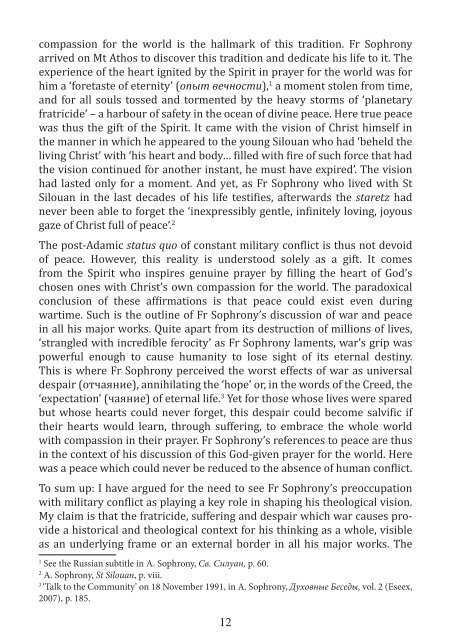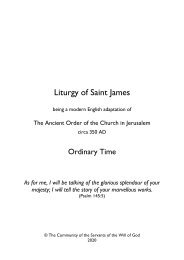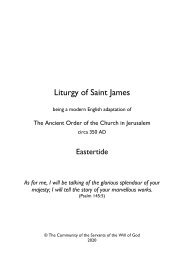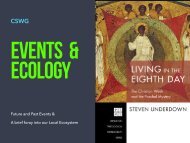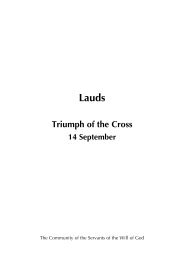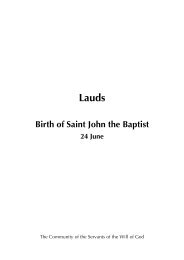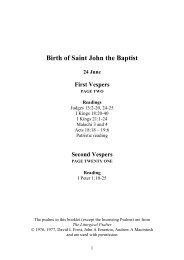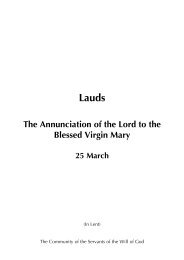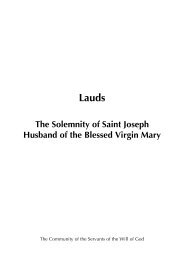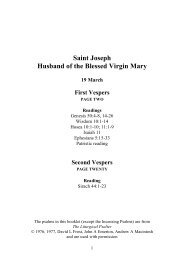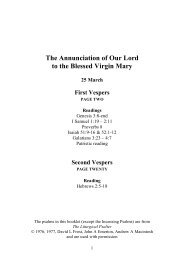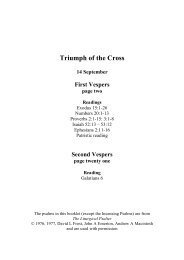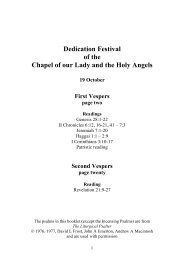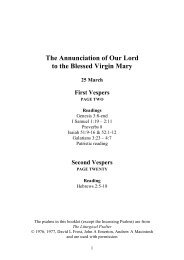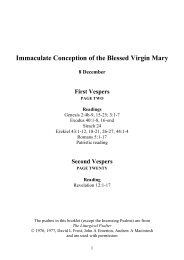Peace in the Face of War
Create successful ePaper yourself
Turn your PDF publications into a flip-book with our unique Google optimized e-Paper software.
compassion for <strong>the</strong> world is <strong>the</strong> hallmark <strong>of</strong> this tradition. Fr Sophrony<br />
arrived on Mt Athos to discover this tradition and dedicate his life to it. The<br />
experience <strong>of</strong> <strong>the</strong> heart ignited by <strong>the</strong> Spirit <strong>in</strong> prayer for <strong>the</strong> world was for<br />
him a ‘foretaste <strong>of</strong> eternity’ (опыт вечности), 1 a moment stolen from time,<br />
and for all souls tossed and tormented by <strong>the</strong> heavy storms <strong>of</strong> ‘planetary<br />
fratricide’ – a harbour <strong>of</strong> safety <strong>in</strong> <strong>the</strong> ocean <strong>of</strong> div<strong>in</strong>e peace. Here true peace<br />
was thus <strong>the</strong> gift <strong>of</strong> <strong>the</strong> Spirit. It came with <strong>the</strong> vision <strong>of</strong> Christ himself <strong>in</strong><br />
<strong>the</strong> manner <strong>in</strong> which he appeared to <strong>the</strong> young Silouan who had ‘beheld <strong>the</strong><br />
liv<strong>in</strong>g Christ’ with ‘his heart and body… filled with fire <strong>of</strong> such force that had<br />
<strong>the</strong> vision cont<strong>in</strong>ued for ano<strong>the</strong>r <strong>in</strong>stant, he must have expired’. The vision<br />
had lasted only for a moment. And yet, as Fr Sophrony who lived with St<br />
Silouan <strong>in</strong> <strong>the</strong> last decades <strong>of</strong> his life testifies, afterwards <strong>the</strong> staretz had<br />
never been able to forget <strong>the</strong> ‘<strong>in</strong>expressibly gentle, <strong>in</strong>f<strong>in</strong>itely lov<strong>in</strong>g, joyous<br />
gaze <strong>of</strong> Christ full <strong>of</strong> peace’. 2<br />
The post-Adamic status quo <strong>of</strong> constant military conflict is thus not devoid<br />
<strong>of</strong> peace. However, this reality is understood solely as a gift. It comes<br />
from <strong>the</strong> Spirit who <strong>in</strong>spires genu<strong>in</strong>e prayer by fill<strong>in</strong>g <strong>the</strong> heart <strong>of</strong> God’s<br />
chosen ones with Christ’s own compassion for <strong>the</strong> world. The paradoxical<br />
conclusion <strong>of</strong> <strong>the</strong>se affirmations is that peace could exist even dur<strong>in</strong>g<br />
wartime. Such is <strong>the</strong> outl<strong>in</strong>e <strong>of</strong> Fr Sophrony’s discussion <strong>of</strong> war and peace<br />
<strong>in</strong> all his major works. Quite apart from its destruction <strong>of</strong> millions <strong>of</strong> lives,<br />
‘strangled with <strong>in</strong>credible ferocity’ as Fr Sophrony laments, war’s grip was<br />
powerful enough to cause humanity to lose sight <strong>of</strong> its eternal dest<strong>in</strong>y.<br />
This is where Fr Sophrony perceived <strong>the</strong> worst effects <strong>of</strong> war as universal<br />
despair (отчаяние), annihilat<strong>in</strong>g <strong>the</strong> ‘hope’ or, <strong>in</strong> <strong>the</strong> words <strong>of</strong> <strong>the</strong> Creed, <strong>the</strong><br />
‘expectation’ (чаяние) <strong>of</strong> eternal life. 3 Yet for those whose lives were spared<br />
but whose hearts could never forget, this despair could become salvific if<br />
<strong>the</strong>ir hearts would learn, through suffer<strong>in</strong>g, to embrace <strong>the</strong> whole world<br />
with compassion <strong>in</strong> <strong>the</strong>ir prayer. Fr Sophrony’s references to peace are thus<br />
<strong>in</strong> <strong>the</strong> context <strong>of</strong> his discussion <strong>of</strong> this God-given prayer for <strong>the</strong> world. Here<br />
was a peace which could never be reduced to <strong>the</strong> absence <strong>of</strong> human conflict.<br />
To sum up: I have argued for <strong>the</strong> need to see Fr Sophrony’s preoccupation<br />
with military conflict as play<strong>in</strong>g a key role <strong>in</strong> shap<strong>in</strong>g his <strong>the</strong>ological vision.<br />
My claim is that <strong>the</strong> fratricide, suffer<strong>in</strong>g and despair which war causes provide<br />
a historical and <strong>the</strong>ological context for his th<strong>in</strong>k<strong>in</strong>g as a whole, visible<br />
as an underly<strong>in</strong>g frame or an external border <strong>in</strong> all his major works. The<br />
1<br />
See <strong>the</strong> Russian subtitle <strong>in</strong> A. Sophrony, Св. Силуан, p. 60.<br />
2<br />
A. Sophrony, St Silouan, p. viii.<br />
3<br />
‘Talk to <strong>the</strong> Community’ on 18 November 1991, <strong>in</strong> A. Sophrony, Духовные Беседы, vol. 2 (Εseex,<br />
2007), p. 185.<br />
12


